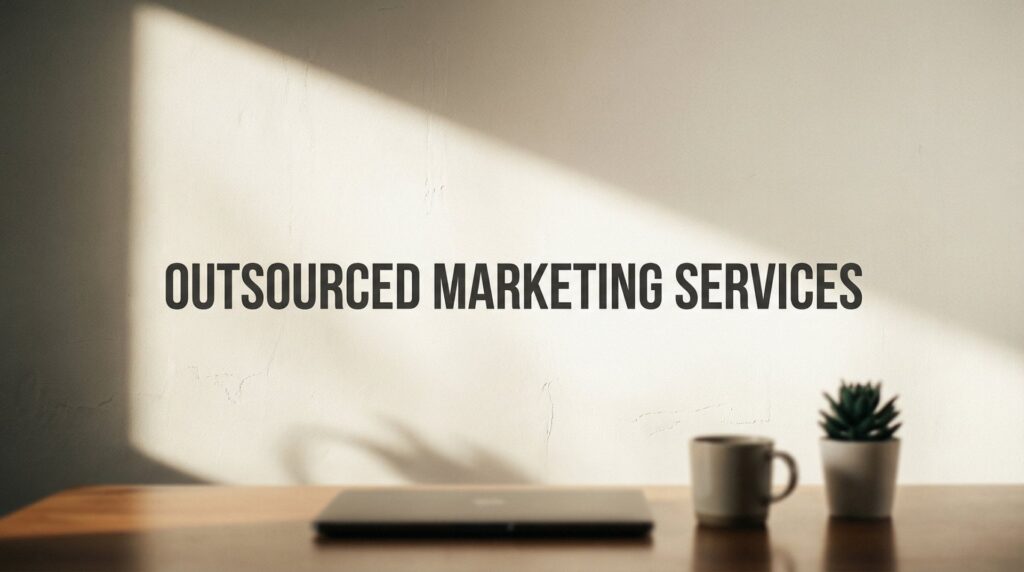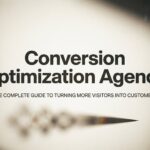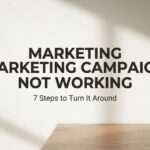Word-of-mouth is great, but it won't keep your calendar full in today’s digital market. Think of SEO services for a catering company as setting up shop on the busiest street in the world: Google Search. If you're not on the first page when someone needs a caterer, you're practically invisible.
This guide breaks down exactly how SEO works for caterers and what you need to do to get more leads.
Why SEO is a Must-Have for Your Catering Business
When you need a local service, what do you do? You probably grab your phone and search for something like "best plumber near me." Your potential clients do the same thing when they need catering.
They're looking for everything from "office lunch catering" to "wedding caterers in Austin." Their journey starts with a search.
In Short: SEO (Search Engine Optimization) is the process of getting your website to the top of search results, so you're visible when people are ready to book.
Connect With People Ready to Book
SEO connects you with customers at the exact moment they need you. Unlike a random ad, SEO helps people who are already looking for a solution. These are high-intent leads ready to hire.
- Corporate Planners: They need a reliable caterer and search for terms like "corporate catering services" or "business lunch delivery."
- Wedding Couples: They are looking for the "top wedding caterers" or "affordable wedding food" in their city.
- Event Hosts: They're planning a party and searching for "party catering near me" or "buffet catering for 50 guests."
Without a solid SEO strategy, you’re missing out on these valuable customers.
Build Your Digital Reputation
Showing up on the first page of Google does more than just get you clicks; it builds instant credibility. People trust the top results. When your catering company appears for the right searches, it signals that you're a serious, reputable business.
This digital authority turns into real-world trust. A professional website, positive online reviews, and high search visibility make people feel confident choosing you.
Simply put, you can't afford to ignore SEO. With about 72% of consumers using Google to find local businesses, it’s where your customers are. If you’re just getting started, a realistic guide to starting a restaurant or catering business can give you a great foundation.
The Recipe for Successful Catering SEO
SEO isn't a secret. It's more like a recipe with a few core ingredients. When you get the mix right, you attract more customers.
For a catering company, understanding these ingredients is the first step to getting found online. We'll cover the three main pillars of SEO and the "secret sauce" for a local business like yours.
The Three Pillars of Catering SEO
Let's look at the three core parts of any solid SEO plan. Each one tells Google that you’re the best caterer in town.
| SEO Pillar | What It Means for Your Catering Company | Example Action |
|---|---|---|
| On-Page SEO | This is everything on your website—your digital menu. It’s how you describe your services, showcase your food, and make it easy for Google to understand what you offer. | Creating a dedicated page for "Corporate Lunch Catering in Boston" with photos, menus, and client testimonials. |
| Off-Page SEO | This is your reputation around town—what other websites and people are saying about you online. Think of it as digital word-of-mouth. | Getting a popular local wedding venue to link to your website from their "Preferred Vendors" page. |
| Technical SEO | This is the "behind the scenes" work that makes your site fast, secure, and easy to use on any device. | Making sure your website loads in under 3 seconds on a smartphone. |
Balancing these three pillars creates a strong foundation for higher search rankings.
On-Page SEO: Your Digital Menu
On-Page SEO covers everything you do on your website to tell Google what you're about. It’s about making your site clear for both search engines and potential clients.
This includes:
- Keyword Placement: Using terms like "wedding catering in Austin" in your page titles, headlines, and service descriptions.
- Quality Content: Creating helpful pages for each of your key services, like 'Holiday Party Catering' or 'Private Chef Menus'.
- Image Optimization: Naming your food photos with descriptive file names (e.g., "gourmet-charcuterie-board-dallas.jpg").
The goal is to make your website an easy-to-read, informative menu that answers a customer's questions.
Off-Page SEO: Building Your Reputation
Next up is Off-Page SEO, which is about actions taken outside of your website to build its authority. When a popular local food blogger links to your site, it’s a powerful vote of confidence that Google notices.
Key off-page activities include:
- Link Building: Earning links from event venues, wedding planners, or local business directories.
- Online Reviews: Encouraging happy clients to leave positive reviews on Google, Yelp, and The Knot.
- Social Media Mentions: Getting shares, tags, and shout-outs on platforms like Instagram and Facebook.
Each signal tells Google that you're a trusted and legitimate catering business.
Technical SEO: A Clean and Efficient Kitchen
Technical SEO is the foundation that everything else is built on. It ensures your website runs smoothly, just like a well-organized kitchen. If your site is slow or broken, people will leave.
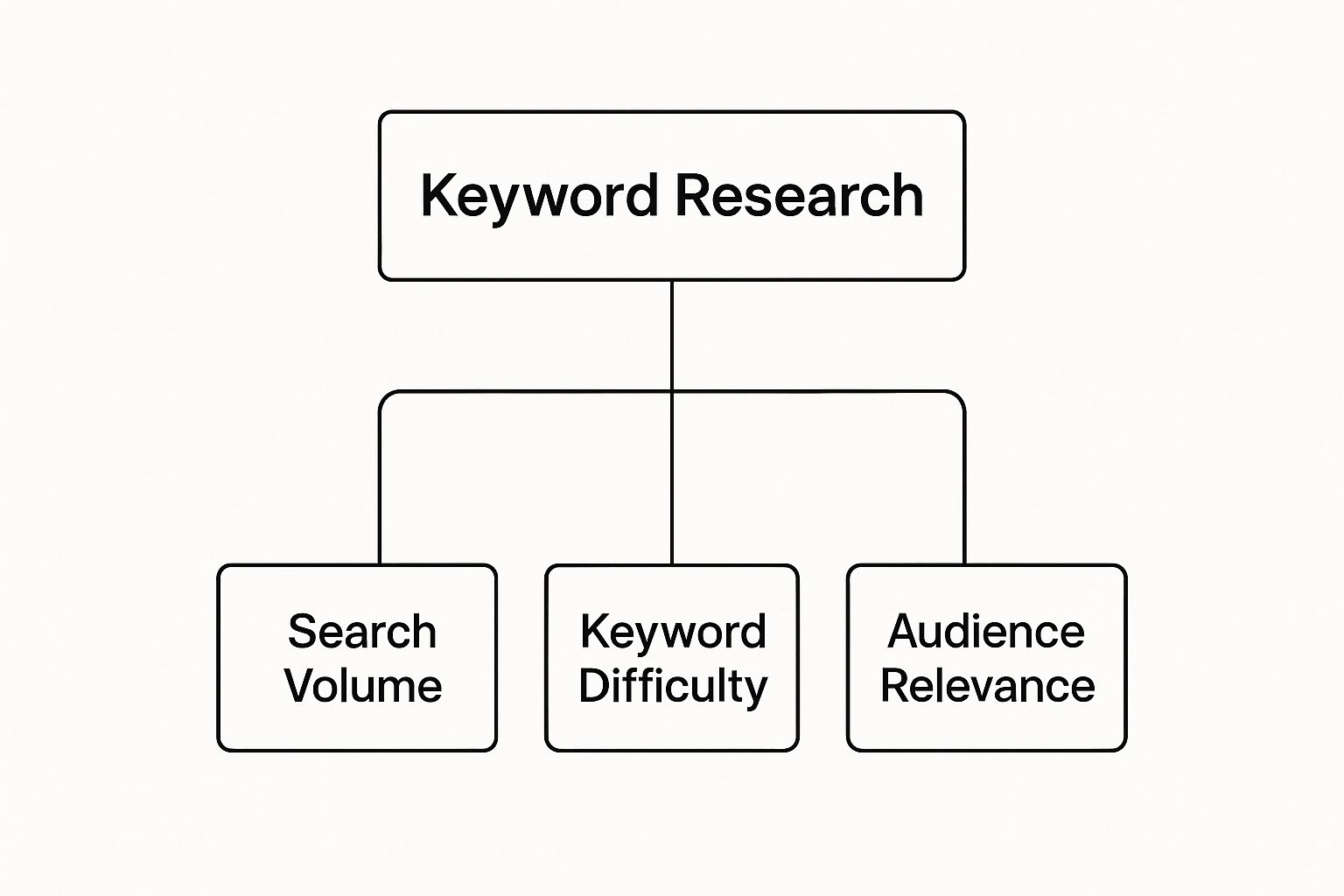
A few huge technical factors include:
- Site Speed: How fast your pages load. Anything over a few seconds loses customers.
- Mobile-Friendliness: Your site must work perfectly on a smartphone.
- Site Security (HTTPS): A secure site (with the little lock icon) protects visitor data and builds trust.
A technically sound website creates a better user experience, and Google rewards that.
Local SEO: The Secret Sauce for Caterers
As a caterer, most of your business is local. That’s where Local SEO comes in. It’s the special ingredient that puts you on the map—literally. The goal is to show up in Google's "map pack" when someone nearby searches for "caterers near me."
This is essential. 99% of people use the internet to find local businesses. You can discover more insights about local search behavior to see how critical this is.
With most searches happening on mobile phones, being visible to local customers is the key to keeping your calendar booked.
Winning Your Local Market with Google
As a caterer, your customers are in your community. Local SEO is your marketing. It’s all about being the first name that appears when someone nearby gets hungry.
The goal is simple: when someone in your city searches for "corporate lunch catering" or "wedding caterer in [Your Town]," you need to show up in Google's "map pack." That's the box with three local businesses at the top of the results.
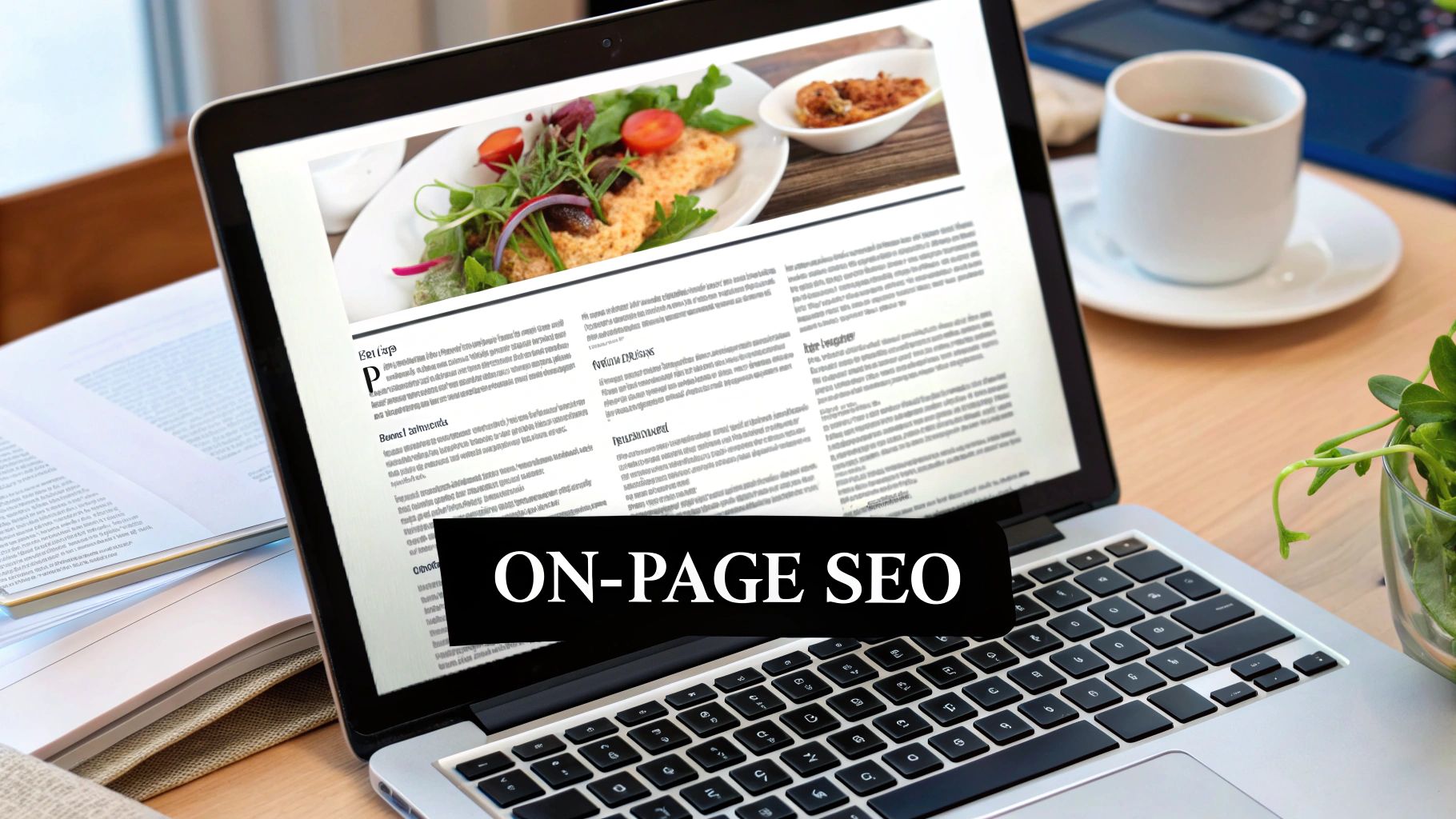
Your Google Business Profile is Your Digital Storefront
Your Google Business Profile (GBP) is your most important online asset. It's the free profile that controls how your business appears on Google Search and Maps. A complete profile can be a lead-generating machine.
To optimize your GBP:
- Complete Every Section: Fill out your business name, address, phone number, website, hours, and service areas. The more info you give Google, the more it trusts you.
- Pick the Right Categories: Your primary category should be "Caterer." Then add secondary categories like "Wedding Caterer" or "Corporate Office Catering." This helps Google send you the right customers.
- Write a Smart Description: Use keywords your customers search for. Talk about the types of events you cater, your popular cuisines, and the neighborhoods you serve.
Show Off Your Best Work
Your GBP is more than a business card. It’s your chance to visually wow potential clients.
In Short: A great Google Business Profile acts like a mini-website on the search results page, giving people the confidence to call you.
Upload high-quality photos and videos often. Show off your best dishes, event setups, and your team in action. People eat with their eyes first.
Also, use Google Posts to share updates and specials.
- Highlight a new seasonal menu.
- Announce a discount for new corporate clients.
- Post photos from a recent wedding you catered.
This activity shows Google you’re open for business, which can boost your local rankings. For more detail, there are great guides on how to improve your local map rankings.
The Power of Directories and Reviews
Make sure your business is listed in other key online directories. You want to be everywhere your clients are looking.
The most important rule? Keep your NAP (Name, Address, Phone number) perfectly consistent across every site.
Make sure you're listed on these directories:
- Industry-Specific Sites: Platforms like WeddingWire, The Knot, and Yelp are crucial.
- General Local Directories: Don't forget Apple Maps, Bing Places, and your local Chamber of Commerce.
Finally, manage your online reviews. Good reviews are social proof. Encourage happy clients to leave a review, and respond to every single one—good or bad.
Serving Up a Menu of Mouth-Watering Content
Good SEO is about creating content that helps people and answers their questions. Think of your website's content as your menu. Each page should solve a specific problem for your ideal client.
By creating pages that speak directly to profitable client types, you send a clear signal to Google and visitors that you're the expert they need.
Build Pages for Your Most Profitable Services
Stop lumping all your services onto one page. Give each core service its own dedicated space. This lets you get specific with your messaging and keywords, which Google rewards.
For example, a corporate planner searches for things like "corporate lunch catering in [Your City]" or "boxed lunch delivery for office meetings." You need a page ready for them.
These pages should include:
- Great Photos: Show off gorgeous spreads from past corporate events.
- Sample Menus: Include clear pricing or package options.
- Client Reviews: Add quotes from happy corporate or wedding clients.
- A Clear Call-to-Action: Make it easy for them to request a quote.
The same logic applies to every specialty. If you do weddings, you need a "Wedding Catering" page. The same goes for "Private Party Catering" or "Holiday Events." You can find surprising content tips in guides like SEO for photographers that also apply to caterers.
Answering Customer Questions with Your Blog
What are the top five questions you get on every sales call? Your blog is the perfect place to answer them. A smart blog strategy turns your website into a helpful resource, attracting people who are planning an event.
This is your chance to target long-tail keywords. These are longer, more specific search phrases people use when they're closer to making a decision.
In Short: When you create content that solves your customers' real problems, you become a trusted expert, not just another vendor.
Just think about the problems your clients face and create content that helps them.
What Are Catering Clients Really Asking?
Here are a few actual questions people are asking Google, which make for great blog post topics:
- How do you choose a menu for a large event? This post can walk them through the process, showing off your expertise in menu planning and logistics.
- Is a buffet or plated dinner better for a wedding? Write a helpful article laying out the pros and cons of each, highlighting how your team excels at both.
- How much does catering for 50 people cost? A post that breaks down average costs attracts serious, qualified leads who have a real budget.
Every blog post should guide the reader toward your service. By consistently publishing useful content, you'll attract the right clients and build your reputation.
Choosing The Right SEO Partner For Your Catering Company
You understand the importance of SEO, but doing it yourself is overwhelming. It’s time to call in experts. But how do you find the right one?
Picking an SEO service for your catering business is about finding a partner who understands local service businesses. You need someone who gets that a "lead" is a potential client, not just a number.
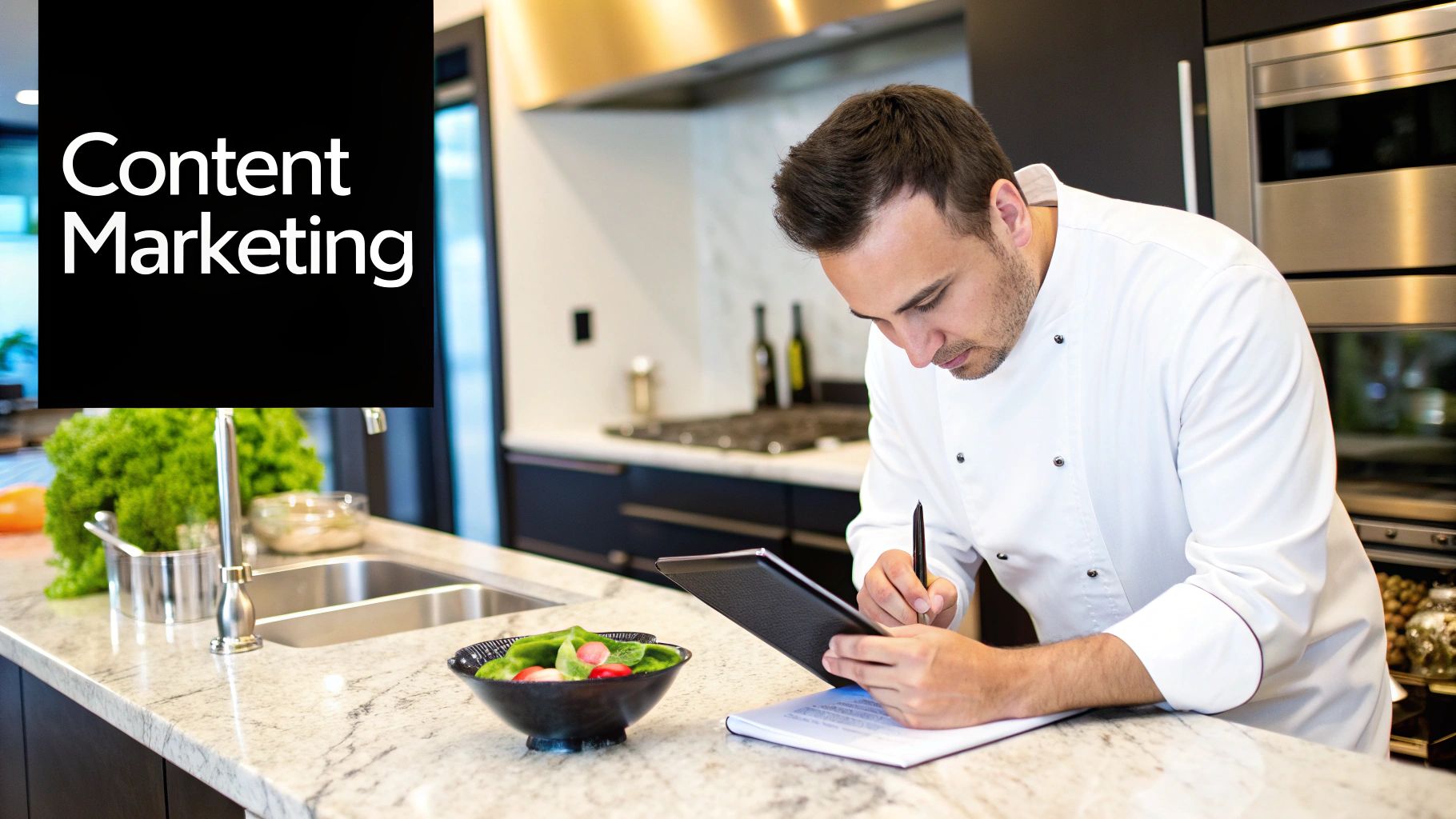
This is a big decision. The right agency can fill your calendar with bookings. The wrong one can waste your budget. Let's walk through what to look for.
What To Look For In An SEO Provider
Not all SEO agencies are the same. A team that sells products online won't understand the nuances of local SEO for a caterer.
Here’s your checklist:
- A Focus on Local SEO: Their website and case studies should show expertise in helping local businesses.
- Transparent Reporting: They should explain how they measure success. Ask for a sample report that tracks keyword rankings, traffic, phone calls, and form fills.
- Realistic Promises: If anyone guarantees the #1 spot on Google in 30 days, walk away. Real SEO is a steady, strategic process.
The catering market is projected to hit $124 billion by 2032. To get your share, you need an expert who can put you in front of high-value clients.
Comparing SEO Provider Options
You have a few different paths. Here’s a quick breakdown of your main options.
| Option | Best For | Potential Cost | Key Consideration |
|---|---|---|---|
| DIY SEO | New businesses with more time than money. | $50 – $300/mo (for tools) | It's a steep learning curve and depends entirely on your effort. |
| Freelancer | Small businesses needing targeted help. | $500 – $2,000/mo | Quality can vary, and it requires more of your management time. |
| Local SEO Agency | Established caterers ready to scale. | $1,500 – $5,000+/mo | This is a partnership. Look for proven results with other local businesses. |
Be realistic about your budget, time, and growth goals before deciding.
Key Questions To Ask Any Potential Agency
Before signing a contract, interview any potential partner. Their answers will reveal their process and expertise.
- What does your onboarding process look like? They should mention an audit, keyword research, competitor analysis, and setting up tracking.
- How do you build links for a local business? Good answers include getting listed in local directories and forming partnerships with venues. Vague answers are a red flag.
- Can you show me a case study from a similar service business? They should have clear success stories from other local businesses.
- How will we communicate? A great partner sets clear expectations, like a dedicated account manager or a monthly strategy call.
To get a better idea of what a good plan involves, check out this breakdown of local SEO services for small businesses.
Red Flags To Watch Out For
Knowing what to avoid is as important as knowing what to look for.
Watch out for these warning signs:
- "Secret Sauce" Strategies: If they won't tell you what they're doing, it's a deal-breaker. Transparency is key.
- A Fixation on "Traffic": Clicks don't pay the bills. You need qualified leads, phone calls, and booked events.
- One-Size-Fits-All Packages: Your business is unique. Your SEO strategy should be too. Avoid cookie-cutter solutions.
Finding the right SEO partner is a serious investment. Take your time, do your homework, and choose a team that feels like an extension of your own.
People Also Ask About Catering SEO
Even with a solid plan, it's normal to have questions. Here are quick answers to the most common questions from caterers.
How much should a catering business spend on SEO?
The honest answer is: it depends. The cost is shaped by your location and your goals. Ranking in New York City is more competitive than in a smaller town.
In Short: Most small to medium catering businesses should expect to invest between $1,500 and $5,000 per month for a comprehensive SEO service.
Think about it this way: if one new corporate client is worth $10,000 to your business, the investment pays for itself quickly.
How long does it take for SEO to work for catering?
Patience is key. SEO is a marathon, not a sprint. Real, lasting results take time to build.
You'll usually see the first signs of progress within 3 to 6 months. This might be higher rankings or more website traffic.
A meaningful flow of new calls and quote requests typically takes 6 to 12 months of steady work. SEO has a snowball effect; it builds momentum over time.
Can I do SEO myself?
You can! Some parts of SEO are things you should be involved in. Nobody knows your customers better than you.
A few tasks are perfect to handle yourself:
- Manage Your Google Business Profile: Keep it fresh with new photos, posts, and by responding to all reviews.
- Focus on Reviews: Encourage happy clients to share their experience on Google, The Knot, or Yelp.
- Take Great Photos: Use your phone to snap pictures of your food, team, and events.
However, the more technical side of SEO—like site audits, keyword research, and link building—can be a massive time-suck. For most busy caterers, a hybrid approach works best. You handle the basics, and you bring in a professional seo services catering company to do the heavy lifting.
What are the best keywords for a caterer?
Getting keywords right is the foundation of your strategy. The best keywords for a catering business usually fall into three buckets:
- Service-Based Keywords: "corporate lunch catering," "buffet style catering."
- Location-Based Keywords: "wedding catering in Boston" is powerful for attracting local clients.
- Event-Based Keywords: "holiday party catering," "graduation catering."
You also want to target long-tail keywords. These are longer phrases that signal someone is further along in their search. "Catering" is broad. But a search for "how much does wedding catering cost for 100 guests" is from someone seriously planning an event. Answering these specific questions on your blog is a great way to attract high-quality leads.
Ready to stop worrying about where your next booking is coming from? The team at Clicks Geek lives and breathes local SEO. We help businesses just like yours take over their market so you can focus on what you do best: creating incredible food and unforgettable experiences. Schedule your free consultation today!
Want More Leads for Your Business?
Most agencies chase clicks, impressions, and “traffic.” Clicks Geek builds lead systems. We uncover where prospects are dropping off, where your budget is being wasted, and which channels will actually produce ROI for your business, then we build and manage the strategy for you.


